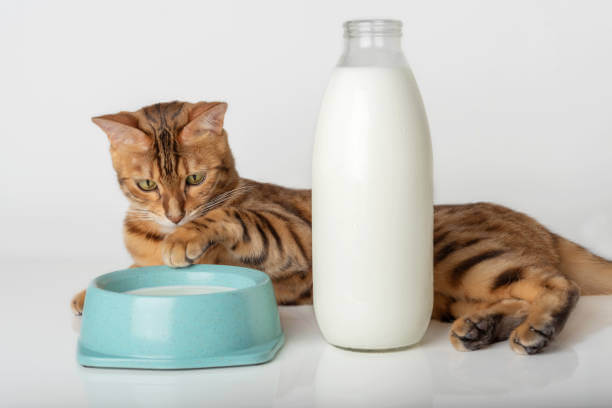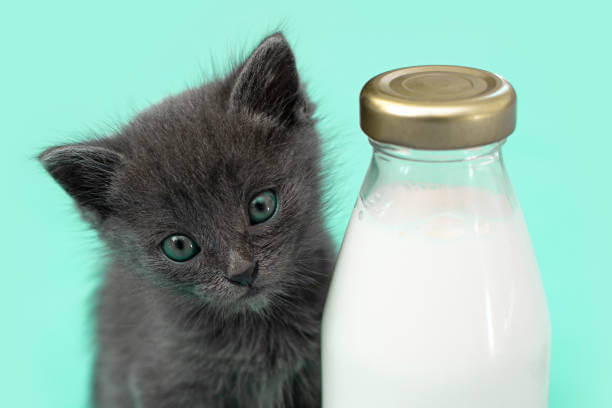Cats Drink Almond Milk? Learn about their digestive system and whether or not they can drink this alternative milk. Get the facts today. We all know that cats are notorious for their selective eating habits and finicky nature. As responsible pet owners, it’s our duty to ensure that our feline friends are consuming a balanced and appropriate diet. But what about almond milk? You may be wondering if it’s safe to share this popular dairy alternative with your beloved cat. In this article, we will delve into the intricacies of feline digestion and explore whether cats can safely consume almond milk. So before you pour a bowl for your curious kitty, let’s separate fact from fiction.

Understanding the Feline Digestive System
Before we can determine whether cats can drink almond milk, it’s essential to understand their unique digestive system. Unlike humans, who are omnivorous and can digest a wide range of foods, cats are obligate carnivores.
The Carnivorous Nature of Cats
Cats have special dietary requirements due to their evolutionary history as hunters. Their bodies have adapted over thousands of years to efficiently process and extract nutrients from animal protein sources. The feline digestive system is designed to break down animal tissues and convert them into essential nutrients such as amino acids, fatty acids, and vitamins.
Lactose Intolerance in Cats
One crucial aspect of feline digestion is lactose intolerance. Like many mammals, kittens produce an enzyme called lactase that helps them digest their mother’s milk. However, as they transition into adulthood, the production of lactase significantly decreases. This decrease in lactase production makes it difficult for adult cats to digest lactose—the sugar found in milk—leading to various digestive issues such as diarrhea or upset stomachs.
The Risks of Feeding Almond Milk to Cats
Now that we understand the basics of feline digestion, let’s examine the potential risks of feeding almond milk to cats. While almond milk may be a suitable dairy alternative for humans, it is not without its drawbacks when it comes to our feline companions.
Nutritional Imbalance
Almond milk lacks the essential nutrients that cats need for optimal health. Cats require specific amino acids, vitamins (such as vitamin A and taurine), and fatty acids that are only found in animal sources. Feeding them a diet deficient in these vital nutrients can lead to severe health issues in the long run.
Allergies and Digestive Upset
Cats can develop allergies or sensitivities to various foods, including nuts like almonds. Introducing almond milk into their diet increases the risk of allergic reactions, which can manifest as skin irritations, vomiting, itching, or diarrhea. Additionally, almond milk contains natural compounds that may disrupt the delicate balance of a cat’s digestive system, leading to gastrointestinal distress.
Safer Alternatives for Hydration
While it’s clear that cats should not consume almond milk due to their unique dietary needs and lactose intolerance, there are safer alternatives available to keep your feline friend hydrated.
Fresh Water: The Best Choice
The primary source of hydration for cats should always be fresh water. Cats have a low thirst drive compared to other animals due to their evolutionary history as desert-dwelling creatures. Providing clean water in multiple locations around your home encourages your cat to stay hydrated throughout the day.
Cat-Safe Milk Replacements
If you’re looking for a milk-like treat for your cat, consider specially formulated cat milk replacements available at pet stores. These products are designed with feline nutritional needs in mind and are often lactose-free. However, it’s still crucial to moderate the amount given as excessive consumption can lead to digestive upset.
Are there any benefits of giving almond milk to cats?
No, there are no nutritional benefits to giving almond milk to cats. Almond milk does not contain the essential nutrients that cats need for optimal health. Additionally, cats can develop allergies or sensitivities to almonds, leading to digestive issues such as vomiting, diarrhea and stomach upset. Furthermore, almond milk has a high water content which can lead to dehydration in cats if consumed in excessive amounts. Therefore, it is not recommended to give almond milk to cats as a regular part of their diet.
It is also important to note that while it may seem harmless, giving your cat cow’s milk as a treat is also not recommended due to its high lactose content. Cow’s milk can cause digestive issues such as diarrhea and vomiting in cats, especially if they are lactose intolerant.

Final Verdict: Can Cats Drink Almond Milk?
The answer is no, cats should not consume almond milk. Almond milk does not provide the essential nutrients that cats need, and it can lead to potential health issues such as allergies or digestive distress. To keep your feline friend hydrated, stick to fresh water and specially formulated cat milk replacements available at pet stores. In this way, you can ensure that your kitty is getting all the nourishment they need to live a long and healthy life.
When it comes to cats, moderation is key – don’t forget that treats should comprise no more than 10% of their daily caloric intake. In addition, always consult with your veterinarian before introducing any new foods into your cat’s diet. This will help ensure you are making the best nutritional choices for your pet and providing them with a balanced and nutritious diet.
Final Thoughts
At the end of the day, it’s important to understand your cat’s unique dietary needs and to make sure they are consuming a balanced diet that is tailored towards their nutritional requirements. Fresh water should always be their primary source of hydration, but specially formulated cat milk replacements can also make an excellent treat. As long as you keep portions moderate and consult with your veterinarian before introducing any new foods into your cat’s diet, you can keep them healthy and happy for years to come.
FAQS
Q. Are there any health benefits to giving my cat almond milk?
A. No, cats should not consume almond milk and there are no health benefits associated with doing so. Almond milk does not provide the essential nutrients that cats need and can lead to digestive issues such as allergies or stomach upset. Fresh water and specially formulated cat milk replacements available at pet stores are the safest and healthiest options for providing hydration to cats.
Q. Can cats drink cow’s milk as a treat?
A. No, it is not recommended to give cow’s milk to cats as a treat due to its high lactose content. Cow’s milk can cause digestive issues such as diarrhea and vomiting in cats, especially if they are lactose intolerant. Fresh water and specially formulated cat milk replacements are the safest and healthiest options for providing hydration to cats.
Q. What dietary changes should I make if my cat is lactose intolerant?
A. If your cat is diagnosed with lactose intolerance, it is important to make sure that their diet contains no dairy products or lactose-containing ingredients. Fresh water and specially formulated cat milk replacements are the best choices for providing hydration to cats, as they do not contain lactose.
Q. How much cat milk should I give my cat as a treat?
A. Whenever giving your cat any kind of treat, it’s important to remember to keep portions moderate – treats should comprise no more than 10% of their daily caloric intake. Additionally, always consult with your veterinarian before introducing any new foods into your cat’s diet so that you can make sure the treats you give are a safe and nutritious part of their diet.
Q. Are there any other alternatives to almond milk that I can give my cat?
A. Yes, cats should not consume almond milk due to their unique dietary needs and lactose intolerance. However, there are safer alternatives available to keep your feline friend hydrated, such as fresh water and specially formulated cat milk replacements available at pet stores.
Conclusion
In conclusion, cats should not consume almond milk due to their unique dietary needs and lactose intolerance. There are no nutritional benefits associated with giving almond milk to cats, and it can lead to potential health issues such as allergies or digestive distress. Fresh water and specially formulated cat milk replacements available at pet stores are the safest and healthiest options for providing hydration to cats – make sure to keep portions moderate and consult with your veterinarian before introducing any new foods into your cat’s diet. By following these tips, you can ensure that your kitty is getting all the nourishment they need to live a long and healthy life.
